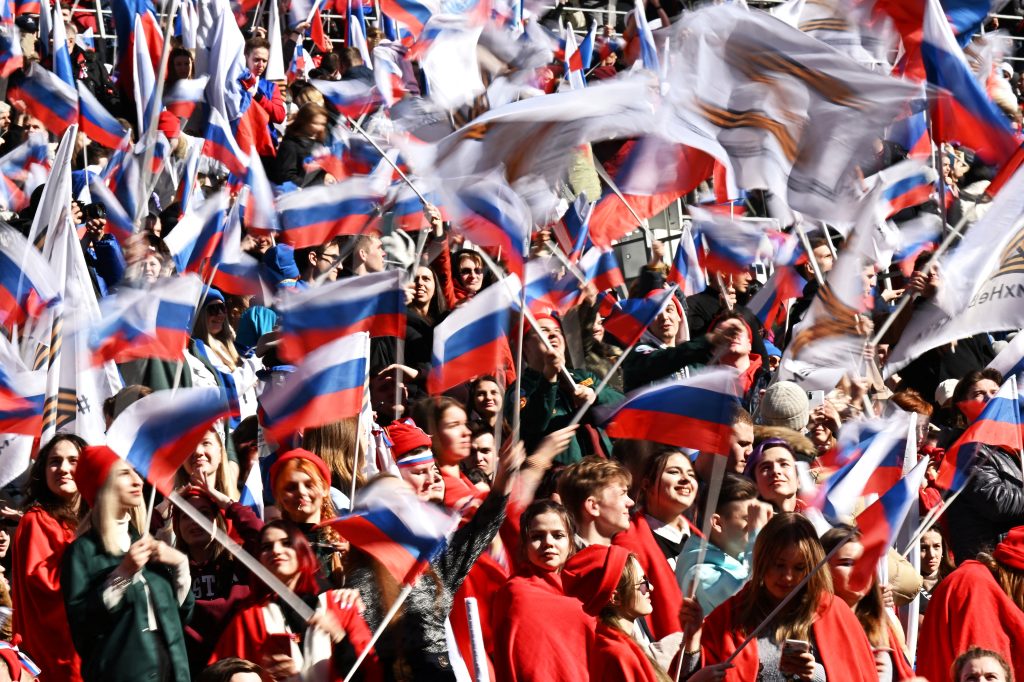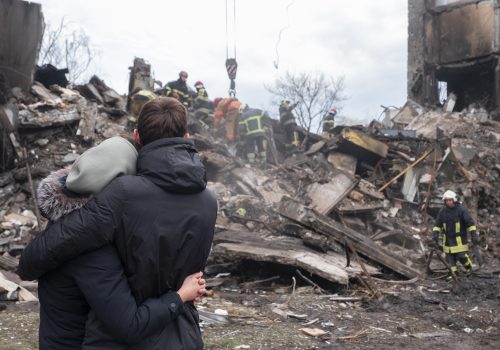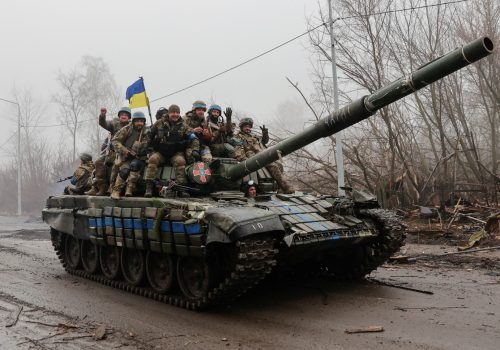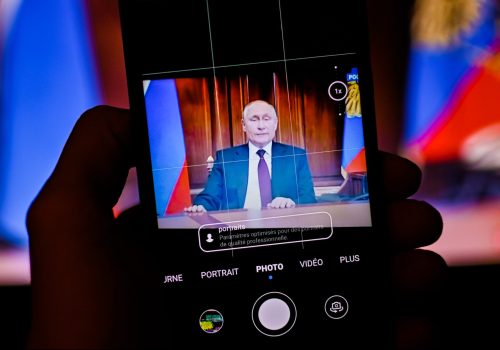Vladimir Putin’s Ukraine War is not going according to plan, with Ukrainian forces rebuffing attempts to capture Kyiv and forcing a general Russian retreat from the north of the country. Nevertheless, there remains no end in sight to hostilities, with every indication that Moscow is preparing for a long campaign. As the Russian military begins a new offensive in eastern Ukraine, the Kremlin is accelerating efforts to indoctrinate young Russians and consolidate the pro-war consensus on the domestic front for a further generation.
Videos and pictures are currently appearing across the country of young Russians showing their support for the invasion of Ukraine. Many of the children and teens featured in this pro-war content display the “Z” symbol that has become emblematic of the war following its adoption as a marker by Russia’s invasion force.
This emphasis on youth is no accident. It reflects concerns within the Kremlin that internet-savvy younger Russians are more resistant to state propaganda and have the knowledge to access censored information online. The emerging generation is also more likely to hold favorable views of Europe and the United States than older Russians who continue to get most of their information from Putin’s propaganda networks.
This caution is easy to understand, especially given the prominence of students and teens during a wave of protests that took place during the first weeks of the invasion. However, these protests have since died down amid indications that government intimidation tactics are proving effective. The Kremlin has encouraged Russians to rally round the flag by portraying the war as an existential struggle between Russia and the West. Meanwhile, anti-war messaging has been denounced as unpatriotic and anti-Russian.
The Kremlin’s polarizing “them and us” framing of the war has been amplified by Putin himself, who has called for a “self-cleansing of society” from “scum and traitors.” This is fuelling aggression against anyone on the wrong side of his dichotomy. In one recent incident, a young investigative journalist’s door in Moscow was targeted with graffiti declaring her a traitor. A young activist who went viral for reading the Russian constitution to riot police during protests in 2019 also recently found graffiti on her door reading “Don’t sell out your homeland, bitch.” In both cases, the menacing messages were accompanied by a “Z.”
Faced with the growing risk of political violence and grim economic prospects, tens of thousands of mostly young Russians are now fleeing the country to places like Turkey, Central Asia, and the South Caucasus. Since the war began on February 24, some estimates put the overall figure for this exodus at around 200,000 people. This includes many of the more progressive elements of Russian society such as independent journalists and tech sector professionals.
Stay updated
As the world watches the Russian invasion of Ukraine unfold, UkraineAlert delivers the best Atlantic Council expert insight and analysis on Ukraine twice a week directly to your inbox.
With opposition to the war among young Russians largely sidelined or silenced, the Kremlin is escalating its long campaign to give Russian kids a “patriotic education” designed to secure their loyalty and shape their future ideological outlook.
Almost ten years ago, Putin called on Russian historians to develop a new history curriculum free from “internal contradictions and ambiguities.” The resulting revisionist version of history included efforts to rehabilitate the personal reputation of Josef Stalin and promote positive aspects of the Soviet era while emphasizing the USSR’s role in the victory over Nazi Germany.
Efforts continue to bring classroom teaching into line with Kremlin thinking. Recent additions to the curriculum have included materials justifying aggression against Ukraine. In Murmansk, schools have been requested to include new materials describing Ukraine’s “genocide against Russians” and the country’s supposed “anti-Russian path.” Teaching materials argue that Ukraine is a Nazi-friendly country controlled by the West.
At the end of March 2022, Russian kindergartens and schools began sharing posts showing their students working in support of the country’s “special military operation” in Ukraine. Children were made to write letters to the front with drawings of military symbols such as ribbons, carnations, the Russian flag, and the now omnipresent “Z.” At one school in Kaliningrad, children learned a new patriotic song redrawing Russia’s borders and featuring the lyrics: “from Donetsk to the Kremlin, from Lugansk to the Kremlin, from Alaska to the Kremlin, this is my motherland.”
Eurasia Center events

Politicized classrooms can have a profound long-term impact on children. Due to their typically narrow social circle, reliance on elders and authority figures, and limited awareness of history and current affairs, children are particularly vulnerable to the kind of indoctrination currently taking place in schools across Russia.
Similar processes are also underway outside of the Russian education system. For example, the Murmansk Youth Committee has been making headlines recently by mobilizing young people for rallies and propaganda videos. These mobilizations have included the involvement of the Murmansk-based North Fleet, which is a source of considerable local prestige and pride.
Many recent pro-war events featuring the participation of young Russians have also relied heavily on Russia’s Youth Army, an organization established in 2015 by Russian Defense Minister Sergei Shoigu to train future military personnel. In recent weeks, Ukrainian intelligence sources have accused Russia of preparing to conscript underage children from the movement to help replenish mounting losses in the ongoing war.
Critics fear public displays of pro-war militarism may help to radicalize a new generation of Russians and lead to the kind of zealotry witnessed during the darkest days of the Soviet era, which saw campaigns encouraging children to denounce their own parents. There are already signs that such trends are reappearing in Russian society. When one Russian schoolteacher recently mentioned to students that she believed the invasion of Ukraine was a “mistake,” a student secretly recorded the exchange and turned her in to the authorities. The teacher received a RUB 30,000 fine and lost her job.
The next big date to watch is May 9 as the Kremlin gears up for its annual WWII Victory Day celebrations. Given Russia’s efforts to frame the invasion of Ukraine as a continuation of the heroic struggle against fascism, this national holiday is likely to be the largest pro-war event since the outbreak of hostilities in late February. The authorities will look to engage as many young Russians as possible and will be aiming to use the strong emotional pull of victory over Hitler to help legitimize the current war effort in Ukraine.
While it is difficult to gauge exactly how effective Kremlin efforts have been in fostering pro-war sentiment among young Russians, the available data suggests considerable success. A March 31 survey by Russia’s leading independent pollster, the Levada Center, found that 71% of 18- to 24-year-olds backed the war, just 10% below the national average for all age groups. Meanwhile, a more recent Levada Center survey found that 54% in the 18-24 segment harbored negative attitudes toward Ukraine compared to an average among all respondents of 57%.
There is a real danger that the wave of fanaticism unleashed by the invasion of Ukraine will create a new generation of radicalized young Russians who enthusiastically embrace the toxic brand of militarism and extreme nationalism promoted by the Kremlin. This could prolong the current confrontation between Russia and the West for many decades to come, leading to the continuation of Putinism long after Putin himself has exited the world stage.
Doug Klain is an assistant director at the Atlantic Council’s Eurasia Center in Washington, DC. Find him on Twitter @DougKlain.
Further reading
The views expressed in UkraineAlert are solely those of the authors and do not necessarily reflect the views of the Atlantic Council, its staff, or its supporters.

The Eurasia Center’s mission is to enhance transatlantic cooperation in promoting stability, democratic values and prosperity in Eurasia, from Eastern Europe and Turkey in the West to the Caucasus, Russia and Central Asia in the East.
Follow us on social media
and support our work
Image: Young Russians wave flags during a pro-war rally in Moscow. March 18, 2022. (RIA Novosti Host Photo Agency/Ramil Sitdikov via REUTERS)




